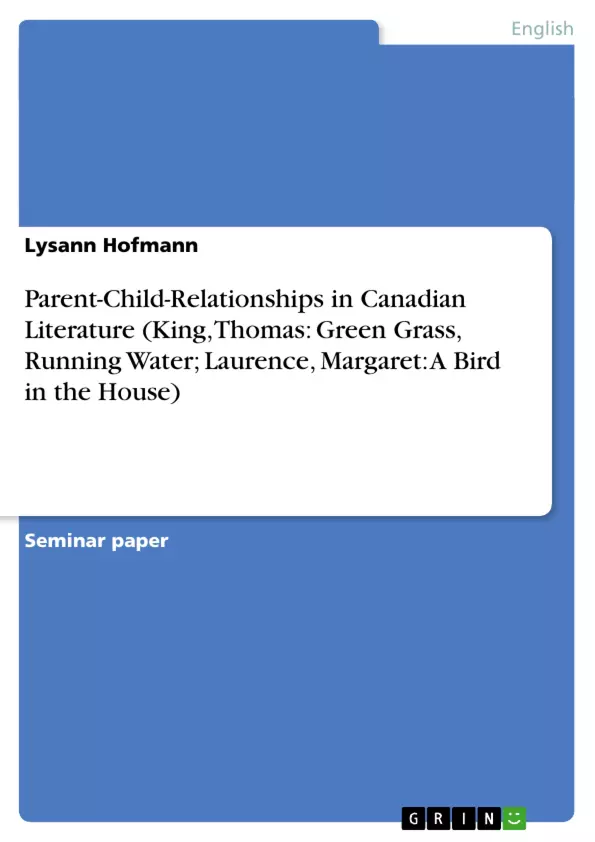There are many different kinds of parent-child relationships:
On the one hand there is the ‘perfect’ relationship, which means that the
parents love their children and they love their parents. This seems to be
wonderful, but there are also problems. For example, in some cases the
people love their children so much that they become thoroughly spoilt.
On the other hand there is the total ‘family disaster’, which means that in
some cases the parents don’t even have any contact with their children.
Unfortunately, there are many relationships which have this character.
All in all, it is very difficult for parents to build up a really good relationship
to their children. Childhood is the most important time in a human’s life: The
children see their parents as the ‘best’ people in the world and expect them to
behave like this. Later, when the children get older, they develop in different
ways and it will be more difficult for the parents to do the right things. So,
the expectations of the children remain the same, but they make it more
difficult for their parents. In this way, there can develop many problems.
Such parent-child relationships are one of the main subjects in A Bird in the
House by Margaret Laurence and Green Grass, Running Water by Thomas
King. These two novels are about relationships and in which way these
relationships work. Furthermore, it is talked about different kinds of people’s
behaviour and what effect it has on other people.
Inhaltsverzeichnis (Table of Contents)
- Parent-Child-Relationships in Canadian Literature
- A Bird in the House by Margaret Laurence
- Green Grass, Running Water by Thomas King
- The Relationship between Ewen and his parents
- The Relationship between the Connors and their daughters
- The Relationship between Vanessa and her parents
- Family and Cultural Values in Green Grass, Running Water
Zielsetzung und Themenschwerpunkte (Objectives and Key Themes)
This paper aims to explore the complexities of parent-child relationships as depicted in two Canadian literary works: A Bird in the House by Margaret Laurence and Green Grass, Running Water by Thomas King. The analysis focuses on the dynamics within these relationships, examining how they shape individual characters and contribute to the broader themes of family, identity, and cultural values.
- The influence of parent-child relationships on individual development and identity formation.
- The complexities of familial dynamics, including love, conflict, and misunderstandings.
- The portrayal of different parent-child relationship models, including those characterized by affection, neglect, and dominance.
- The impact of cultural values and societal expectations on family relationships.
- The importance of communication and understanding in fostering healthy parent-child relationships.
Zusammenfassung der Kapitel (Chapter Summaries)
The analysis begins by examining the relationship between Ewen and his parents in A Bird in the House. Ewen's father, who died when Vanessa was a baby, is portrayed as a distant figure. Ewen's relationship with his mother is complex, characterized by a dynamic where Ewen attempts to care for and understand her while she struggles to connect with him.
The paper then shifts to the relationship between the Connors and their daughters, Beth and Edna. This relationship is marked by the dominant presence of the father, while the mother, Grandmother Connor, acts as a mediator. The dynamic between Edna and her father, a man who exhibits harshness and a lack of understanding, is particularly challenging. The death of Grandmother Connor sheds light on the family's dynamics, highlighting the unresolved issues within the parent-child relationship.
The final section of the analysis explores the relationship between Vanessa and her parents in A Bird in the House, emphasizing the positive bond between them. The death of Ewen, as described in the short story "A Bird in the House," serves as a pivotal event that underscores the depth of the relationship between Vanessa and her father.
In Green Grass, Running Water, the focus shifts to family and cultural values. The novel explores two distinct groups: those who value their family and culture and those who initially reject these traditions. Although the parent-child relationships are not central to the narrative, the novel provides insights into familial dynamics and the role of culture in shaping individual identity.
Schlüsselwörter (Keywords)
This paper delves into the intricacies of parent-child relationships in Canadian literature, focusing on key themes of family dynamics, individual development, cultural values, and societal expectations. It examines the complexities of communication, understanding, and conflict within these relationships, exploring their impact on character formation and the overarching themes of the works. Key concepts include family, identity, cultural values, communication, understanding, and conflict, as depicted in the novels A Bird in the House and Green Grass, Running Water.
Frequently Asked Questions
What are the key themes of parent-child relationships in Canadian literature?
The analysis focuses on identity formation, familial conflict, the impact of cultural values, and the differences between affectionate and dominant relationship models.
How is the relationship between Ewen and his parents depicted in "A Bird in the House"?
Ewen’s father is a distant figure, while his relationship with his mother is complex, involving Ewen caring for her while she struggles to connect with him.
What role does the father play in the Connor family in Laurence's work?
Grandfather Connor is a dominant and harsh figure, creating a challenging dynamic for his daughters, Beth and Edna, while the grandmother acts as a mediator.
How does Thomas King explore family in "Green Grass, Running Water"?
King explores the role of cultural traditions and family values, contrasting those who embrace their heritage with those who initially reject it.
Why is communication important in these literary relationships?
Both novels highlight that misunderstandings and a lack of communication often lead to "family disasters," whereas understanding is key to healthy development.
- Citar trabajo
- Lysann Hofmann (Autor), 2002, Parent-Child-Relationships in Canadian Literature (King, Thomas: Green Grass, Running Water; Laurence, Margaret: A Bird in the House), Múnich, GRIN Verlag, https://www.grin.com/document/23056



